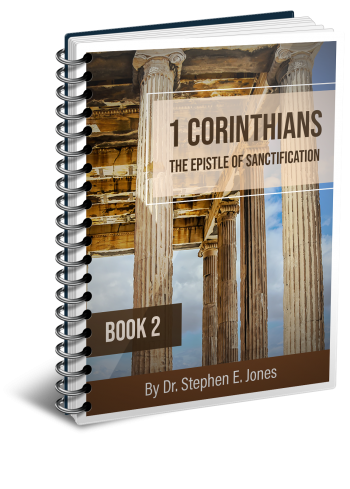Latest Posts
View the latest posts in an easy-to-read list format, with filtering options.

An in-depth commentary/study on chapters 7 through 11 of First Corinthians.
Category - Bible Commentaries

Paul now seems to move on to two other topics before returning to his discussion about communion. Both of these other topics contribute to our understanding of communion, each in its own way. In the last section of chapter 10, Paul returns to the controversy regarding eating food sacrificed to idols, which he had already discussed in chapter 8.
This topic was controversial in the first century church. As we have just seen from 1 Cor. 10:18-22, Paul would not have anyone partake of communion with idolaters. However, as we saw earlier from chapter 8, those who bought and ate food in the marketplace—excess food from a pagan temple—were not partaking of communion with pagans.
1 Corinthians 10:23-26 the apostle says,
23 All things are lawful, but not all things are profitable. All things are lawful, but not all things edify. 24 Let no one seek his own good, but that of his neighbor. 25 Eat anything that is sold in the meat market, without asking questions for conscience’ sake; 26 For the earth is the Lord’s, and all it contains.
Paul’s overriding principle was love. He was not telling the church that murder and theft were now lawful. He was saying that you may purchase anything in the market without worrying about whether or not it had been dedicated to an idol, because regardless of how men may treat the food, they cannot override the fact that God owns the earth by right of creation.
Secondly, if there is any negative spiritual impartation in food sacrificed to idols, we have the power to reverse this through a simple blessing on our food and drink (1 Tim. 4:3-5). Since a prayer of blessing and thanksgiving was noncontroversial and accepted in the church, that should have settled this issue.
However, not all believers shared Paul’s understanding of the word. So Paul accommodated them and instructed people to show love to such people, so as not to cause offense. Even though it was technically lawful to eat food given to a pagan temple, it may not be edifying to offer such food to one who thought that eating such food was an act of communion with pagans.
Love rules. It is the second of the two great commandments, for the law itself says in Lev. 19:18, “you shall love your neighbor as yourself.” God did not put away the law, nor did Paul intend to tell us that it is now lawful to violate this law. In fact, the entire law hangs upon love, as Jesus Himself said in Matt. 22:37-40. If a law appears to contain no love, the problem is not the law itself, but men’s understanding and application of that law.
In 1 Cor. 10:27-29 Paul tells us in a practical manner how to behave, saying,
27 If one of the believers invites you [to dinner], and you wish to go, eat anything that is set before you, without asking questions for conscience’ sake. 28 But if anyone should say to you, “This is meat sacrificed to idols,” do not eat it, for the sake of the one who informed you, and for conscience’ sake; 29 I mean not your own conscience, but the other man’s; for [“but”] why is my freedom judged by another man’s conscience?
Paul says to defer to the conscience of others. It is obvious that Paul’s graciousness was being extended toward those who disagreed with his position of “freedom” to eat such meat. Hence, Paul was telling his own followers to show love to those whose might be offended by such freedom. But this principle of love ought to flow both ways, he says. If Paul’s followers should defer to another man’s conscience, then “why is my freedom judged by another man’s conscience?”
In other words, Paul’s critics ought to show love as well. Men ought not to be offended at those who freely eat meat sacrificed to idols with no twinge of conscience. In 1 Cor. 10:30 Paul continues,
30 If I partake with thankfulness, why am I slandered concerning that for which I give thanks?
Apparently, Chloe’s letter had revealed that someone in the Corinthian church strongly believed that eating meat from a pagan temple was an act of idolatrous communion. He was slandering Paul in an unloving manner for his “freedom.” Paul thus appealed to his opponent to show the same love that all believers ought to show their neighbors.
There will always be disputes and differences of opinion in regard to the interpretation of the law. But if everyone has a right attitude toward God and His law, then such differences fall into the category of conscience, rather than rebellion. It is only when we cast aside the law that a real problem arises, for then conscience actively subverts the law. Such a person knows that the law forbids something but yet feels free to do it anyway. That problem is known as anomia, “lawlessness.”
However, Paul was speaking to believers who had not been taught to put away the law. If Paul had put away the law, the “Jewish” faction would have roundly criticized him for doing this. The murkier issues of conscience would have paled in comparison to casting aside Moses. In fact, when Paul visited the Jerusalem church, he found it necessary to refute rumors that he had put away the law by his new understanding of it. In Acts 21:21 the elders say to Paul,
21 and they have been told about you, that you are teaching all the Jews who are among the Gentiles [ethnos, “nations”] to forsake Moses, telling them not to circumcise their children nor to walk according to the customs.
It was true that Paul had abandoned physical circumcision, for he believed that it was a sign of the Old Covenant. Heart circumcision was for New Covenant believers. Physical circumcision was how men defined a Jew, but heart circumcision was how God defined a Jew (Rom. 2:28, 29). This was, of course, a radical departure from the old way of thinking, although it should be pointed out that this principle had never changed.
One’s covenant relationship with God has always been about the heart. Though the Old Covenant was given, it never saved a single person. Those who have depended upon their own vow for their salvation have all failed to keep it. Only those who believed God’s New Covenant promise have ever been pleasing to God, for without faith it is impossible to please God (Heb. 11:6).
So Paul certainly did violate the Jewish “customs,” that is, their understanding of the law that had been established by long tradition. To disagree with long-established rabbinical authority was a major issue. The hottest dispute was about circumcision, but meat sacrificed to idols was another big issue. The problem, however, was in men’s inability to see the distinction between the law and men’s understanding of the law. When understanding becomes equal to inspiration, and when the traditions are equated to the law itself, a religion becomes rigid and unable to handle the progression of revelation that inevitably comes to us through time.
Paul concludes this section in 1 Cor. 10:31-33, saying,
31 Whether, then, you eat or drink or whatever you do, do all to the glory of God. 32 Give no offense, either to Jews or to Greeks or to the church of God; 33 just as I also please all men in all things, not seeking my own profit, but the profit of the many; that they may be saved.
The command to “give no offense” is for all sides of any dispute. The problem is that if just one side is offensive, and if the other side never seeks to offend the other, religion will remain rigid and unable to receive further revelation of the word. Paul had obviously offended the Jewish faction which sought to maintain good relations with the temple. In fact, James, the head of the Jerusalem church, spent long hours in the temple, where he was revered as a Nazirite and an intercessor for Jerusalem. If James had openly taught the things that Paul taught, he would have been forbidden to enter the sanctuary.
But Paul’s ministry was to “gentiles,” and it was important for him to teach them the principles of the New Covenant, unencumbered by the traditions of the Jews which he well knew. Hence, Paul strongly defended the freedom of non-Jews by not demanding their circumcision. This meant, of course, that those uncircumcised Greeks could not enter the temple grounds without violating the Jewish traditions. But insofar as their relationship with God was concerned, it made no difference.
There are times when it is necessary to take a stand for truth, even if it offends people. Proclaiming the cross of Christ itself was an offense to the Jews (1 Cor. 1:23), and yet without the cross, no Jew could be saved. In one’s zeal for evangelizing Jews, one cannot avoid the truth of the cross in order to avoid offending them.
There are other important issues as well, which are offensive to Jews. A major issue involves the idea that Jews are a chosen race by virtue of biological descent from Abraham. This was a major issue in the first century, and it has again become a major issue in recent years. Paul says that Jesus broke down the dividing wall that had separated Jews from all others (Eph. 2:14), but today Christian Zionists have rebuilt that wall.
Hence, the principle of “one new man” has been discarded once again in favor of two separate categories of ethnicities, one chosen and the other not. This is an important legal issue, for it violates the principle of God’s impartiality, which is a foundation stone of biblical justice and the character of God Himself.
Shall we then defer to the conscience of Christian Zionism and refuse to offend their conscience? We certainly ought to refrain from slander and unloving accusations, but nonetheless, we must remain witnesses to the truth and to all that Jesus accomplished. He loved all men, but yet He offended many. How, then, can we avoid doing the same?